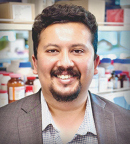City of Hope® has been awarded an up to $23.7 million contract from the Advanced Research Projects Agency for Health (ARPA-H) within the U.S. Department of Health and Human Services. The grant will help City of Hope to create a biomap of tumor changes that cause immunotherapy resistance in advanced or metastatic non–small cell lung cancer (NSCLC).
City of Hope’s Beckman Research Institute researchers will also test new biomarker-guided therapies in near real-time NSCLC, which accounts for 87% of all lung cancer cases. By shaping physicians’ management of the disease, the new findings offer promise for improving treatment success and extending the lives of the 200,000 patients diagnosed each year in the United States.
A 6-year clinical trial, enrolling 535 patients, will provide the cornerstone for the City of Hope project, which is part of ARPA-H’s Advanced Analysis for Precision Cancer Therapy (ADAPT) program. The up to $142 million initiative combines the latest technologies with the nation’s top expertise in tumor biology to deliver customized cancer care that adapts to a patient’s disease as it evolves.

Ravi Salgia, MD, PhD

Aritro Nath, PhD

Jyoti Malhotra, MD, MPH
“Changes in cancer may occur over time, creating resistance to immunotherapy and complicating oncologists’ ability to identify the next best treatment approach,” said Ravi Salgia, MD, PhD, Professor and Chair of City of Hope’s Department of Medical Oncology & Therapeutics Research, the Arthur & Rosalie Kaplan Chair in Medical Oncology, principal investigator with City of Hope’s Aritro Nath, PhD, and Jyoti Malhotra, MD, MPH. “Developing a biomap that detects mutations and other alterations early and predicts a patient’s cancer trajectory will enable us to match treatments to evolving tumor biology and improve our patients’ long-term survival.”
“Doctors have historically treated advanced non–small cell lung cancer with immune checkpoint inhibitors, sometimes combined with chemotherapy,” explained Dr. Nath, City of Hope Assistant Professor in the Division of Molecular Pharmacology, Department of Medical Oncology & Therapeutics Research. “The main biomarker used to select immunotherapy, however, is not very reliable, with a patient response rate of less than 40%. We don’t know why some patients become resistant to checkpoint inhibitors, and we have no good biomarkers to guide the choice of secondary treatments.”
Goals of the ADAPT Program
City of Hope intends to change that through meticulous monitoring and measurement of tumor changes in near real time. Dr. Salgia and his colleagues will collect samples and detailed data at regular intervals from patients throughout the course of treatment. The researchers will monitor tumor trajectory and patients’ response to treatment using state-of-the-art diagnostic techniques such as liquid biopsies, single-cell sequencing, and radio imaging, relying on rapid turnaround times for comprehensive tumor measurements.
Instead of measuring a few data types at a single timepoint with limited predictive ability, the ADAPT program will take many measurements of diverse data over time and through multiple lines of treatments. The insights gleaned will help to identify newly acquired resistant traits in tumors, predict the right therapies at each point in a patient’s treatment, and find strategies that provide better long-term prognoses.
“We expect our collaboration with ADAPT will uncover predictive biomarkers that will enhance patient treatment and boost immunotherapy responses in non–small cell lung cancer,” said Dr. Malhotra, Associate Professor in the Department of Medical Oncology & Therapeutics Research and Interim Division Chief of Thoracic Medical Oncology, City of Hope, Los Angeles. “The information we gather will allow for informed adjustments in treatments and improve patient outcomes.”
Role of City of Hope Investigators
Equally important, the trial will leverage City of Hope’s network of more than 35 clinical sites, whose populations reflect the nation’s patients with lung cancer. The research team anticipates enrolling its first patients within 12 months.
With more than 30 years of experience spearheading clinical trials and translational research, Dr. Salgia’s leadership has been instrumental in uncovering key variants in lung cancer. He oversees more than 130 medical oncologists, including a nationwide team of 30 clinicians dedicated to lung cancer.
City of Hope investigators will fund the development, testing, and matching of new biomarkers with therapeutic options that are now available or in a clinical trial. Algorithms and aggregate data sets developed under the program will be made publicly available, allowing scientists around the world to visualize trends and evaluate their implications and insights in near real time.
“We are incredibly excited to launch this ambitious project,” said Dr. Salgia. “Our analysis of host and tumor biology will help clinicians counter the limits of current treatment choices and lead to better patient management strategies for advanced and metastatic non–small cell lung cancer.”

